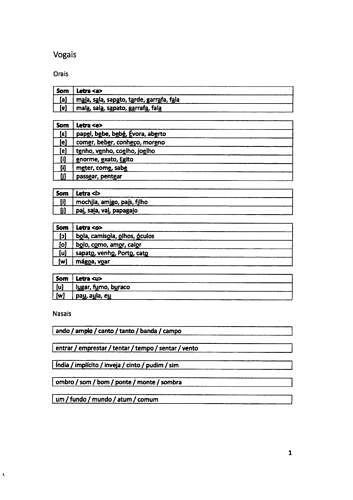On this website vejo is pronounced a bit like “veijo” might sound. It seems that the e sound changes to sort of a long i sound when it is before a j. When I pronouced it this way in my class, my teacher corrected me to “vejo” pronouncing it just as it is spelled. She is a native speaker and has a degree in teaching portuguese so now I’m not sure how to pronounce vejo and other similar words. Can anyone help me understand what is going on?
Bem, em primeiro lugar, tanto quanto sei, “veijo” não existe em português, é uma palavra espanhola.
Em segundo lugar, a diferença entre o “ɐ” fonético e o “e” é bastante sutil. Tão sutil, de facto, que a Infopédia dá as duas opções para a pronúncia de seja - ˈsɐ(j)ʒɐ ou ˈseʒɐ.
Thank you for your answer. When I wrote “veijo” I was trying to give an example of the sound of the word, not the acutal word. I hear the two sounds very differently.
Another way of phrasing my question is on the Practice Portuguese website, “Vejo” is pronounced with the “ai” sound similar to the word Pai. My teacher pronounced the word “Vejo” with an “e” sound similar to “Mesa”. I’m only asking because I want to know which pronuciation to practice and use.
Olá David, Bem, o Joseph é o especialista, mas para o meu ouvido, vejo rima com Tejo - o rio.
Confesso que tenho muita dificuldade em ouvir algumas das diferenças sutilíssimas nos sons das vogais portuguesas. (E muitos portugueses também, segundo me disseram).
Não sei se ajuda, mas junto uma coisa que a minha professora me deu uma vez. Dá exemplos de palavras com cada som e o símbolo fonético. Penso que vem do “Manual de Pronuncia e Prosódia”, do qual não tenho uma copia. A Infopédia é uma fonte muito boa para a fonética, mas não o faz para a conjugação de verbos.
Thank you. It was very thoughtful of you to put this together for me.
@DavidB, most Practice Portuguese’s audio examples are representative of a Lisbon accent, which is also more or less the dominant accent in national media. With this accent, ‘vejo’ will usually sound similar to ‘veijo’. But the word may also be pronounced with more of a medium E sound (which you accurately compared to ‘mesa’) in other regions. I cannot tell you what is the best pronunciation to adopt, because from my perspective, both are valid. If you have plans to move to Portugal and want to blend in with the locals in your intended area of residence, maybe use that as the deciding factor. Meanwhile, you can also ask your teacher for further clarification on why she corrected you.
Great answer, thank you Joseph. I prefer to have an accent that is similar to the national media so I will now confidently use the Practice Portuguese pronuciation any time there is a difference from what I’m hearing locally. I live in the Algarve so sometimes the differences are very surprising!
